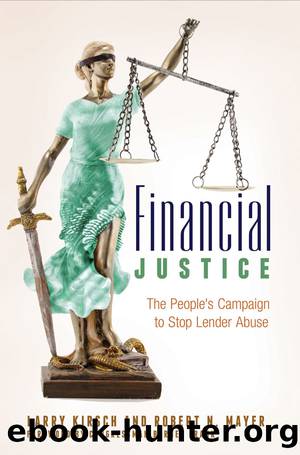Financial Justice: the People's Campaign to Stop Lender Abuse by Kirsch Larry;Mayer Robert N.;Frank Barney;

Author:Kirsch, Larry;Mayer, Robert N.;Frank, Barney;
Language: eng
Format: epub
Publisher: ABC-CLIO, LLC
In 2000, well before Dodd-Frank and the CFPB had ever been contemplated, Ed Mierzwinski, the consumer program director of U.S. PIRG, testified before the House Banking and Financial Services Committee against federal preemption of state laws dealing with abusive ATM surcharges and other banking practices. And in 2003, a coalition of civil rights, fair lending and consumer groups emphatically criticized the Office of the Comptroller of the Currency for trying to preempt state enforcement of antipredatory lending laws against national banks and their subsidiaries.7 Thus, federal preemption of state lending laws, particularly those dealing with enforcement of antipredatory and abusive practices, was not a stranger to members of the House Financial Services Committee considering the proposal to create a new consumer financial protection agency.
Preemption was especially important to the battle against consumer lending abuses because a number of states had taken the lead on predatory lending and had a history of enforcing strong and innovative consumer financial protections in their respective jurisdictions. North Carolina acted first (in 1999) to restrict certain abusive practices on all mortgage loans and to impose additional restrictions on high-cost loans.8 The state of Georgia passed a similar antipredatory lending law in 2002. After that, the Massachusetts attorney general obtained injunctive relief against a state chartered bank, pursuing the innovative claim that its adjustable-rate mortgage products and underwriting practices were âpresumptively unfairâ under Massachusetts law.9
Former state attorney general Eliot Spitzer, speaking for New York and other states, had, in 2008, excoriated the administration of George W. Bush for its apathetic posture toward consumer protections and made the argument that the states could respond more swiftly than their federal counterparts to changing business practices.
Predatory lending was widely understood to present a looming national crisis. This threat was so clear that as New York attorney general, I joined with colleagues in the other 49 states in attempting to fill the void left by the federal government. Individually, and together, state attorneys general of both parties brought litigation or entered into settlements with many subprime lenders that were engaged in predatory lending practices. Several state legislatures, including New Yorkâs, enacted laws aimed at curbing such practices.
â¦Not only did the Bush administration do nothing to protect consumers, it embarked on an aggressive and unprecedented campaign to prevent states from protecting their residents from the very problems to which the federal government was turning a blind eye.â¦The administration accomplished this feat through an obscure federal agency called the Office of the Comptroller of the Currency (OCC).10
Download
This site does not store any files on its server. We only index and link to content provided by other sites. Please contact the content providers to delete copyright contents if any and email us, we'll remove relevant links or contents immediately.
The Social Psychology of Inequality by Unknown(2311)
The Plant Paradox by Dr. Steven R. Gundry M.D(2040)
The Writing on the Wall by Anselm Jappe(1759)
Working for Yourself by J.D. (Nolo) Stephen Fishman(1478)
Every Landlord's Legal Guide by Janet Portman & Stewart Marcia & Ralph Warner(1325)
The First 20 Hours: How to Learn Anything ... Fast by Kaufman Josh(1304)
ADHD on Trial by Michael Gordon(1241)
Decisive by Chip Heath(1201)
Drafting Contracts: How and Why Lawyers Do What They Do, Second Edition by Stark Tina L(1171)
Working for Yourself by Stephen Fishman J.D. (Nolo)(1139)
The Economist Aug 8th 2015 by The Economist(1123)
Restitution by Restitution(1115)
The Economist Aug 29th 2015 by The Economist(1097)
A Practical Guide to International Arbitration in London by Hilary Heilbron(1084)
Intellectual Property Strategy by John Palfrey(1082)
The Lord of the Rings: The Fellowship of the Ring, the Two Towers, the Return of the King by J. R. R. Tolkien(1082)
Collusion by Luke Harding(1045)
Persuasion by Owner(1012)
Chapter 1 by Owner(950)
